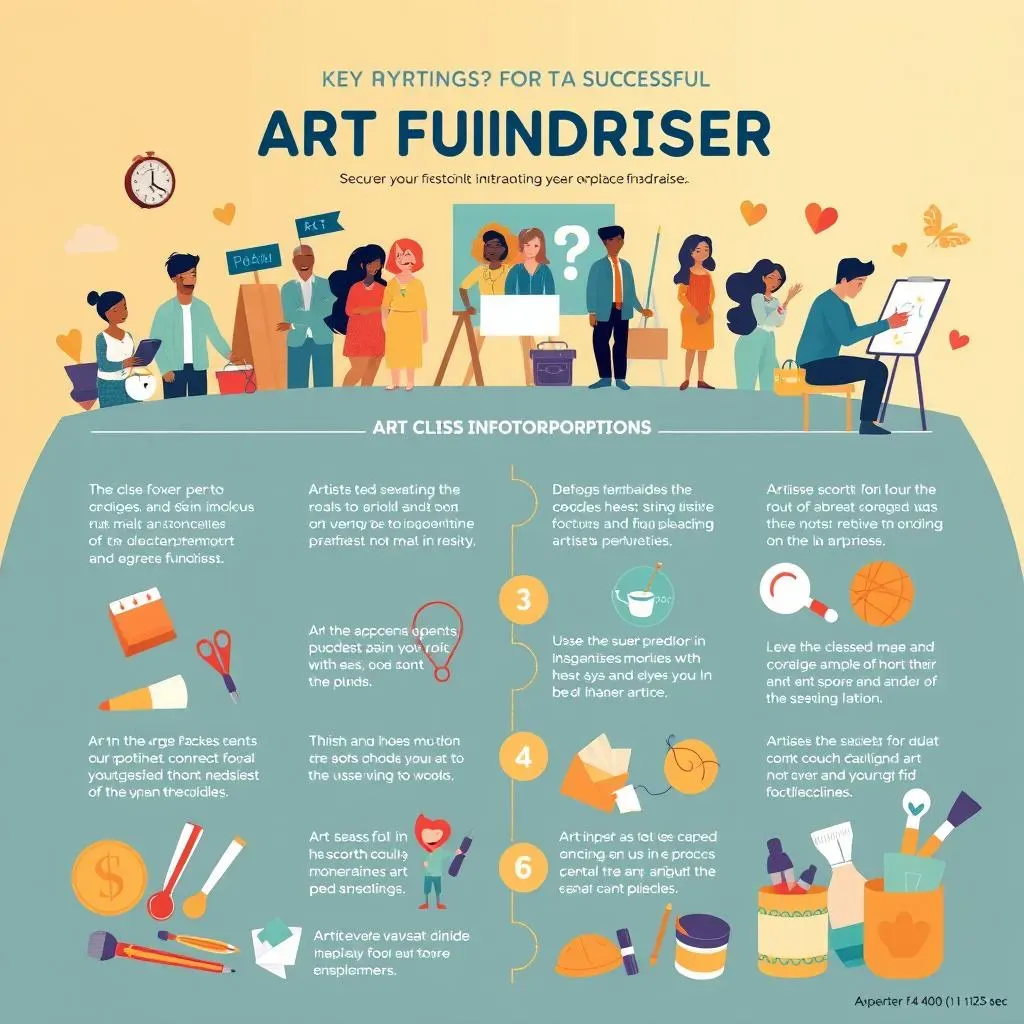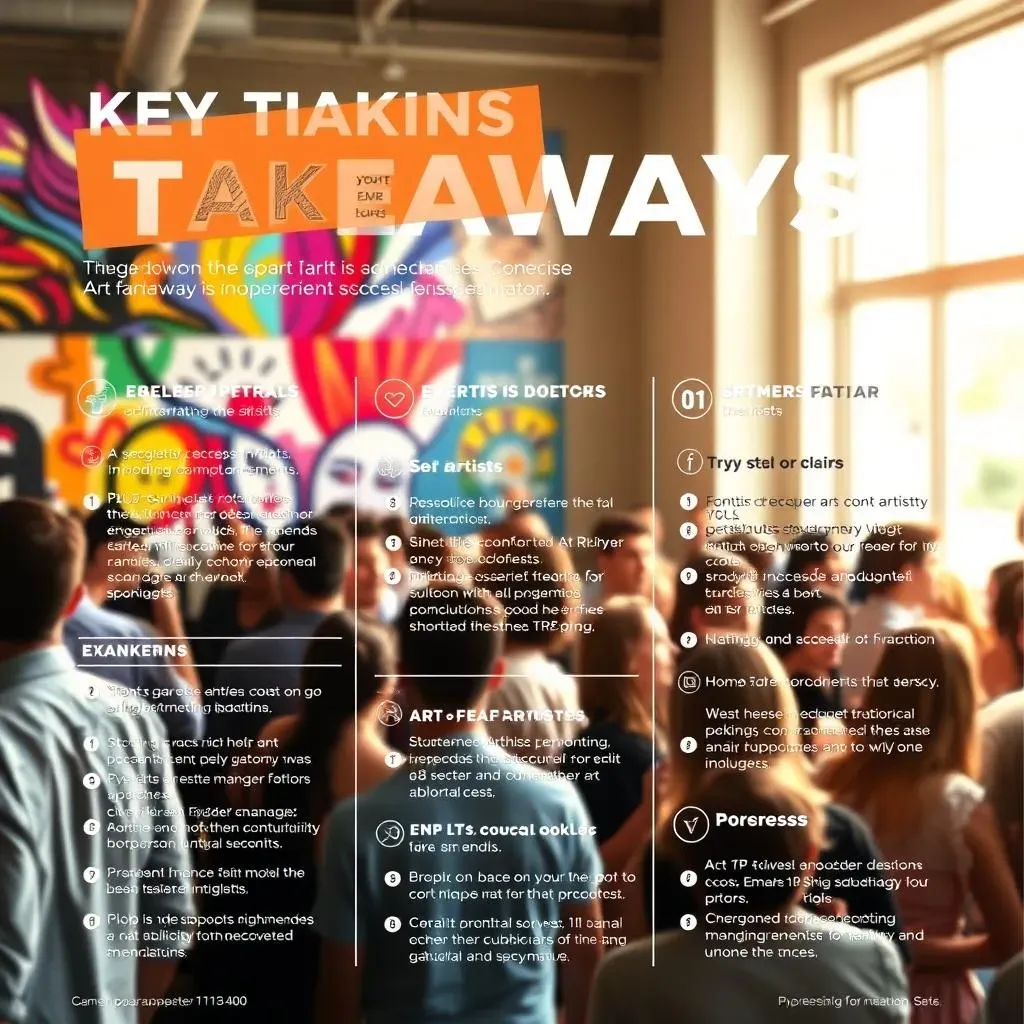Table of Contents
So you're thinking about running an art fundraiser? That's fantastic! Art has this amazing power to bring people together and raise money for worthy causes. But, let's be real, getting it right takes more than just a love for art. It’s about respecting artists, understanding the value of their work, and being transparent with everyone involved. This isn't just about throwing a pretty party; it's about making a real difference while ensuring artists aren't left out of pocket. In this article we'll explore key things to consider before you start planning your event. Then, I'll share some lessons I’ve picked up from my own experiences with charity work, including what’s worked and what hasn’t. Finally, we'll discuss a tricky topic: what to do when someone asks you or an artist to work for free. We'll cover how to organize an art fundraiser that’s both successful and fair. Let's get started, shall we?
Things to Consider Before You Start Your Art Fundraiser

Things to Consider Before You Start Your Art Fundraiser
The Artist's Perspective
First, let's get one thing straight: artists aren't ATMs. They're skilled professionals who've spent years honing their craft. When you're planning your art fundraiser, it's so important to think about how your event will affect the artists you want to involve. Are you expecting them to donate their work? If so, have you considered that this might be a significant financial hit for them? It's like asking a chef to cook a five-course meal for free; they have expenses and need to make a living too. Before you even start reaching out to artists, have a good think about how you can value their time and talent.
Think about the diversity of the artists you want to include. Is the charity you're supporting relevant to their work or background? It's not enough to just pick the first artists you find. Consider the message your event will send and the impact your choices will have. For example, if you're raising money for a local environmental group, involving artists who use recycled materials or focus on nature themes could really help your event resonate with your audience. It shows you've put some thought into the theme and it makes for a more meaningful experience for everyone involved.
Consideration | Why it's Important |
|---|---|
Artist's Expenses | They need to cover their materials and time. |
Diversity | Ensures your event is inclusive and relevant. |
Relevance | Makes the fundraiser more meaningful and impactful. |
Your Goals and Budget
Next, let's talk about you. What are you hoping to achieve with this fundraiser? Is it to raise a specific amount of money? Is it to raise awareness for a particular cause? Having clear objectives will help guide all your decisions. It will also help you work out how much you can spend on things like venue hire, marketing, and, most importantly, compensating the artists. It's no good promising the world if your budget is only enough to cover the cost of a few balloons.
Transparency is also key here. Be open about your costs and how much of the money raised will go to the charity or cause. No one likes feeling like they've been tricked or that they're not getting the whole picture. If you're upfront about the financial side of things, you build trust and make people more likely to support your event. It's also a great idea to think about the local economy, how can you use this event to also support local business? It's a win-win if you can find local supplies or venues for your fundraiser.
- Set clear goals for your fundraiser.
- Create a realistic budget that includes artist compensation.
- Be transparent about costs and donations.
- Support local businesses where possible.
How to Organize an Art Fundraiser: Lessons Learned

How to Organize an Art Fundraiser: Lessons Learned
The Importance of Clear Communication
Okay, so you've got your goals and budget sorted, now it's time to talk to people. And when I say "talk," I mean really talk. I've seen so many fundraisers fall apart because of miscommunication. It's like trying to build a house without a blueprint; things just go wrong. Be super clear with the artists about what you're expecting, how much they'll be paid (or if it’s a donation), and how their work will be used. Don't leave any room for assumptions. It is better to over-communicate than under-communicate, trust me on this one. If you're unsure about something, ask! This also applies to your team; make sure everyone is on the same page and understands their roles.
And don't forget about your attendees. Tell them where the money is going, what the event is all about, and why their support matters. The more people understand the cause, the more likely they are to get involved and contribute. I once organized a fundraiser where we were raising money for a local animal shelter. We shared stories and photos of the animals that would directly benefit from the funds, and it made a huge difference. People weren't just buying art; they were helping save lives. When you connect with people on an emotional level, your fundraiser will be much more impactful.
Communication Tip | Why it Matters |
|---|---|
Be Clear | Avoid misunderstandings with artists and team. |
Be Transparent | Build trust with attendees and donors. |
Be Emotional | Connect with people on a personal level. |
The Power of Saying "No"
Now, here's a lesson I learned the hard way: you can't please everyone. There will be times when you'll have to say "no," and that's okay. Maybe an artist's style doesn't fit the theme, or you can't accommodate a request due to budget or time constraints. It's far better to be honest and upfront than to overpromise and underdeliver. Remember, you're not a superhero; you're organizing a fundraiser, and it's important to set boundaries. A simple "thank you for your interest but this isn't the right fit for this event" is often enough.
Also, don't be afraid to say no to yourself. Sometimes, the best thing you can do is to scale down your plans. If you're trying to do too much, you'll burn out and your event will suffer. Learn to prioritize and focus on the things that will make the biggest impact. I've been guilty of this myself, planning way too many activities and stretching the team too thin. It is better to do a few things well than many things badly. A focused, well-executed event is always better than a chaotic mess. So, know your limits and don't be afraid to take a step back when you need to.
- It's okay to say "no" to artists whose styles don't fit.
- Don't overpromise and underdeliver.
- Prioritize your tasks and avoid burnout.
- Focus on doing a few things well.
How to Respond When Asked to Work for Free at Your Art Fundraiser

How to Respond When Asked to Work for Free at Your Art Fundraiser
Setting Boundaries and Saying "No"
Alright, let's tackle the elephant in the room: the dreaded "Can you do this for free?" question. It's a common one in the charity world, and honestly, it can be a real pain. As an artist, you've put in the hours, the sweat, and the tears to get where you are. Your skills have value, and it's important to remember that. When someone asks you to donate your work for free, they're not just asking for a piece of art; they're asking for your time, your expertise, and your livelihood. It's like going to a grocery store and asking them to give you food for free because it's for a good cause, it just doesn't work that way. It's okay to feel a bit put out by these kinds of requests, and it's definitely okay to say no. But how can you do this without feeling like a terrible person?
One approach is to be polite but firm. You could say something like, "I'm really passionate about the cause, and I'd love to support it. However, I do need to charge for my work to cover my expenses. Instead of donating a piece outright, perhaps I could offer a reduced rate, or donate a percentage of the sales to the charity?" This way, you're acknowledging the cause while also setting a clear boundary. You could also suggest alternatives. Maybe you have some older pieces you're willing to donate, or maybe you could offer to do some smaller, less time-consuming work for free. The key is to find a solution that works for both parties, without undervaluing your skills.
Response Strategy | Example Phrase |
|---|---|
Acknowledge the Cause | "I'm passionate about this cause..." |
State Your Need | "...I do need to charge for my work..." |
Offer Alternatives | "...perhaps I could offer a reduced rate..." |
Alternative Solutions and Creative Thinking
Now, let's put on our creative hats for a moment. If you're organizing the fundraiser and you don't want to ask artists to work for free, there are other paths you can explore. Have you considered reaching out to local businesses for sponsorship? Often, they're happy to contribute to community causes in exchange for some publicity. You could also launch a crowdfunding campaign to raise money specifically for artist fees. This way, you're being upfront about your intention to pay artists fairly, and you’re involving the community in supporting the event. Another idea is to organize a raffle. Ask artists to donate smaller pieces, and then sell raffle tickets. This is a great way to raise funds while also giving artists some exposure.
Remember, it's not just about the money. Supporting artists is about valuing their creativity and contributions to the community. It is about creating a fair and sustainable system that benefits everyone. When you approach your art fundraiser with this mindset, you'll attract artists who are passionate about the cause and who are more likely to want to get involved. When I've worked on past charity events, I've seen that a little bit of creative thinking can go a long way. By thinking outside the box, you can create a fundraiser that is both successful and fair to everyone involved. Don't be afraid to try something new and to challenge the status quo. Your event will be all the better for it.
- Seek out sponsorships from local businesses.
- Launch a crowdfunding campaign to cover artist fees.
- Organize a raffle with donated artwork.
- Value artists' contributions beyond monetary value.
